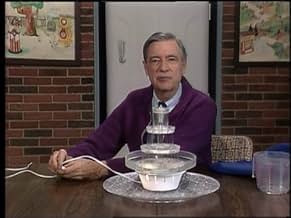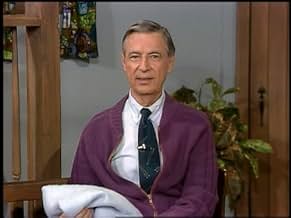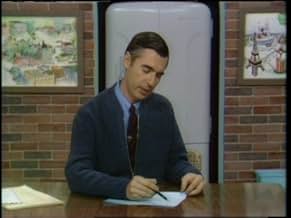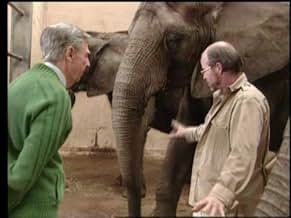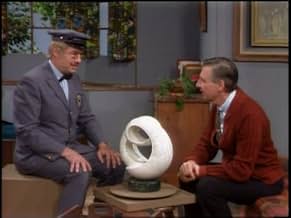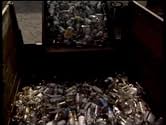CALIFICACIÓN DE IMDb
8.8/10
10 k
TU CALIFICACIÓN
Fred Rogers explora diversos temas para los jóvenes espectadores a través de presentaciones y música, tanto en su mundo como en el Barrio de Make-Believe.Fred Rogers explora diversos temas para los jóvenes espectadores a través de presentaciones y música, tanto en su mundo como en el Barrio de Make-Believe.Fred Rogers explora diversos temas para los jóvenes espectadores a través de presentaciones y música, tanto en su mundo como en el Barrio de Make-Believe.
- Nominado a 3 premios Primetime Emmy
- 8 premios ganados y 66 nominaciones en total
Explorar episodios
Opiniones destacadas
The Mr. Rogers you saw pay a television visit to your house was the same Mr. Rogers in real life should you ever have run into him. On the night of writing this we lost Fred Rogers who passed away at the age of 74 years of age. His show took the basics of 1950's TV production and stayed with it even since. It was all about having a conversation with his TV friend. In broadcasting you may speak to many people, but speak as only one person was talking to you.
His first show was the Children's Corner (1953-61) which featured a woman by the name of Josie Carry. Although he got hosting credit, he never appeared in front of the camera, but rather was the puppeteer. The Children's Corner developed most of his puppet characters including Daniel Stripped Tiger, Henrietta Pussycat, X the Owl, and King Friday XIII. The Children's Corner was done live at Non-Commercial TV station WQED in Pittsburgh. It was a fun show if anything, and Josie and the puppets talk about Mr. Rogers a lot.
After Children's Corner he moved to Canada and did a show simply called Mister Rogers (1962-64), and it was first time he was on camera. The show was 15 minutes but it developed something which we know now as the Neighborhood of Make-believe. This Neighborhood was the majority of this short show, but Fred Rogers would appear at the beginning and ending of the program, and he would show off a few things before he had "make-believe" with the viewers. Usually it was some kind of vehicle that takes us to the Make-believe world.
In 1966 Fred returned to WQED and all that he developed would come together and Mister Rogers Neighborhood signs on the air for the first time. Fred wrote and sang shows for the show, and he showed fun things to the audience. His trips to the Neighborhood of Make Believe incorporated storylines about how people (and puppets) no matter how hard they try they should just try to be themselves and deal with live life issues in the fantasy world. Mr. Rogers also took us around the TV neighborhood on soundstages at first but the post 1979 shows took us to actual places in the real world.
Fred Rogers never liked TV for himself, but he knew how to use it to make an impact on people, and impact he did. He did most of the writhing on the show, nobody would dare tell him what to do, not saying they would. I would have loved to meet him myself, but I will never get that chance. He didn't care about being a celebrity. Just someone who cared about people and try to a "neighbor" to them.
Rest In Peace.
His first show was the Children's Corner (1953-61) which featured a woman by the name of Josie Carry. Although he got hosting credit, he never appeared in front of the camera, but rather was the puppeteer. The Children's Corner developed most of his puppet characters including Daniel Stripped Tiger, Henrietta Pussycat, X the Owl, and King Friday XIII. The Children's Corner was done live at Non-Commercial TV station WQED in Pittsburgh. It was a fun show if anything, and Josie and the puppets talk about Mr. Rogers a lot.
After Children's Corner he moved to Canada and did a show simply called Mister Rogers (1962-64), and it was first time he was on camera. The show was 15 minutes but it developed something which we know now as the Neighborhood of Make-believe. This Neighborhood was the majority of this short show, but Fred Rogers would appear at the beginning and ending of the program, and he would show off a few things before he had "make-believe" with the viewers. Usually it was some kind of vehicle that takes us to the Make-believe world.
In 1966 Fred returned to WQED and all that he developed would come together and Mister Rogers Neighborhood signs on the air for the first time. Fred wrote and sang shows for the show, and he showed fun things to the audience. His trips to the Neighborhood of Make Believe incorporated storylines about how people (and puppets) no matter how hard they try they should just try to be themselves and deal with live life issues in the fantasy world. Mr. Rogers also took us around the TV neighborhood on soundstages at first but the post 1979 shows took us to actual places in the real world.
Fred Rogers never liked TV for himself, but he knew how to use it to make an impact on people, and impact he did. He did most of the writhing on the show, nobody would dare tell him what to do, not saying they would. I would have loved to meet him myself, but I will never get that chance. He didn't care about being a celebrity. Just someone who cared about people and try to a "neighbor" to them.
Rest In Peace.
Mr. Rogers was and is a huge positive influence in the lives of small children. His passing away leaves a huge emptiness in the hearts of those who grew up watching him.
In what is all to often a violent and unsure world, Mr. Rogers was the voice of stability and kindness that children could rely on. He always stressed the importance of learning, responsibility, and caring for yourself and others. His kind and gentle demeanor and slow, pronounced way of speaking were absolutely perfect for small kids, making them feel as if they were in the presence of another parent. In fact, Mr. Rogers WAS a kind of third parent to many children, particularly for many during the late 1970s and 1980s, when former at-home mothers were increasingly working outside the home and had less time for them.
Mr. Rogers' greatest legacy was his continuous reminder that he "likes you just the way you are" or "thinks you're great just for being you". This is such an important message for small children who are still forming their ideas about who they are and how they fit into a society that is very often not as kind (and too often, horribly cruel). Individuality and imagination were celebrated gifts.
To this day, I don't have the slightest idea how Fred Rogers came to know children so well, where he got this gift to communicate with them and speak to them on their level. I do know that he is a national treasure who will never be forgotten by millions of people. Mr. Rogers was the ultimate combination of a teacher and a best friend, and is utterly irreplaceable.
In what is all to often a violent and unsure world, Mr. Rogers was the voice of stability and kindness that children could rely on. He always stressed the importance of learning, responsibility, and caring for yourself and others. His kind and gentle demeanor and slow, pronounced way of speaking were absolutely perfect for small kids, making them feel as if they were in the presence of another parent. In fact, Mr. Rogers WAS a kind of third parent to many children, particularly for many during the late 1970s and 1980s, when former at-home mothers were increasingly working outside the home and had less time for them.
Mr. Rogers' greatest legacy was his continuous reminder that he "likes you just the way you are" or "thinks you're great just for being you". This is such an important message for small children who are still forming their ideas about who they are and how they fit into a society that is very often not as kind (and too often, horribly cruel). Individuality and imagination were celebrated gifts.
To this day, I don't have the slightest idea how Fred Rogers came to know children so well, where he got this gift to communicate with them and speak to them on their level. I do know that he is a national treasure who will never be forgotten by millions of people. Mr. Rogers was the ultimate combination of a teacher and a best friend, and is utterly irreplaceable.
Never have I seen something that sincere. Never have I thought there's something that could make me cry so hard. Never have I felt so much love from the other side of the TV screen.
A pure kindness.
A pure kindness.
Like many kids of the early 70's, I used to watch the PBS trinity. Sesame Street taught us about letters and numbers while The Electric Company taught us about reading. Mr. Rogers had the hardest job of all though; he taught us about feelings, socialization and the adult world.
Everything about the show was crafted to be warm and friendly without being boring or patronizing. Mr. Roger's tools were puppets, videos and original music, all of which were used to great effect. Even so, the show was about how people feel and relate, and for that it needed a Human element. Mr. Rogers and his neighbors were that element, and they were expert teachers.
As the focal-point of the show ("star" just doesn't seem right), Mr. Rogers always spoke directly to the camera, as if speaking directly to the children who were watching. His manner was always calm and inviting, unlike a certain purple dinosaur whose hyperactive manner almost demands that you like him. More importantly, Mr. Rogers always conveyed an air of dignity. Contrast that with many modern shows that tend to portray adults as fools. That may be good for a cheap laugh, but kids know that adults are in charge. Who wants a fool to be in charge? Kids shows will come and go, but there will never be another Mr. Rogers. He didn't want to sell the kids things, he didn't expect them to be "cool," and he didn't want to replace their parents. he just wanted to be their neighbor.
Everything about the show was crafted to be warm and friendly without being boring or patronizing. Mr. Roger's tools were puppets, videos and original music, all of which were used to great effect. Even so, the show was about how people feel and relate, and for that it needed a Human element. Mr. Rogers and his neighbors were that element, and they were expert teachers.
As the focal-point of the show ("star" just doesn't seem right), Mr. Rogers always spoke directly to the camera, as if speaking directly to the children who were watching. His manner was always calm and inviting, unlike a certain purple dinosaur whose hyperactive manner almost demands that you like him. More importantly, Mr. Rogers always conveyed an air of dignity. Contrast that with many modern shows that tend to portray adults as fools. That may be good for a cheap laugh, but kids know that adults are in charge. Who wants a fool to be in charge? Kids shows will come and go, but there will never be another Mr. Rogers. He didn't want to sell the kids things, he didn't expect them to be "cool," and he didn't want to replace their parents. he just wanted to be their neighbor.
Mr. Rogers did what few artists have done in the history of mankind - strengthened and supported his audience so profoundly and so generously that he became a transformative force in their lives. I feel fortunate to have learned from him. In all too many homes, Mr. Rogers was and is the only voice of understanding, gentleness and positive reinforcement. Imagine how different our world would be if more young people could be exposed to his philosophy of acceptance and love.
There are so many children who never hear their parents say the words "I love you" - not once, not ever. And then they hear Mr. Rogers sing of all the ways people say "I love you," like "the cooking way" and "the eating way," and it's a comfort and reassurance beyond words. No other public figure provides this kind of life-changing insight to the people most in need.
On behalf of everyone you helped, of all the souls you touched in a badly damaged world, Mr. Rogers - we thank you, and we love you.
There are so many children who never hear their parents say the words "I love you" - not once, not ever. And then they hear Mr. Rogers sing of all the ways people say "I love you," like "the cooking way" and "the eating way," and it's a comfort and reassurance beyond words. No other public figure provides this kind of life-changing insight to the people most in need.
On behalf of everyone you helped, of all the souls you touched in a badly damaged world, Mr. Rogers - we thank you, and we love you.
¿Sabías que…?
- TriviaMr. Rogers always explained to the audience what he was doing when he fed his fish. This was in response to a piece of mail from a blind girl who wanted to know when it happened on each episode.
- ErroresIn the 1979-1981 episodes when Mr. Rogers takes off his sweater and closes the closet door, he'd often close it too fast so it came open a ways, but then the closet door begins to close on its own, as if someone were behind the door pulling it closed.
- Citas
Mr. Rogers: You make each day a special day. You know how, by just your being you. There's only one person in this whole world like you. And people can like you exactly as you are.
- Créditos curiososRight before the end credits of "Conflict" #1525, a message appears on screen that says, "And they shall beat their swords into plowshares. And their spears into pruning forks; Nation shall not lift up sword against nation. Neither shall they learn war anymore".
- Versiones alternativasVarious theme-week episodes were released to video in the late-1980s in a special format. For instance, the week of "Day Care and Night Care" (#1516-1520) was released to video under the title "When Parents Are Away", and featured the Neighborhood of Make-Believe segments, edited into new segments featuring Mr. Rogers, as well as old segments like him visiting the day care home. In the old version, Fred meets Mr. McFeely at Brockett's bakery and they go to the day care home together. But in the video version, Mr. McFeely visits Mr. Rogers from Brockett's bakery and they leave from the house.
- Bandas sonorasWon't You Be My Neighbor?
Performed by Fred Rogers
Selecciones populares
Inicia sesión para calificar y agrega a la lista de videos para obtener recomendaciones personalizadas
Detalles
- Tiempo de ejecución30 minutos
- Color
- Relación de aspecto
- 1.33 : 1
Contribuir a esta página
Sugiere una edición o agrega el contenido que falta

Principales brechas de datos
By what name was Mister Rogers' Neighborhood (1968) officially released in India in English?
Responda







